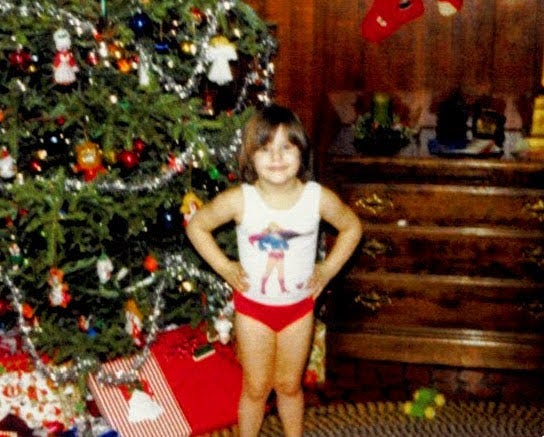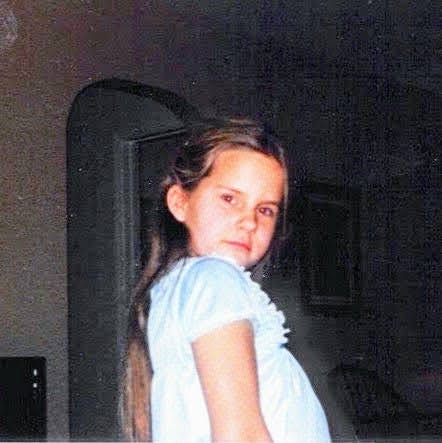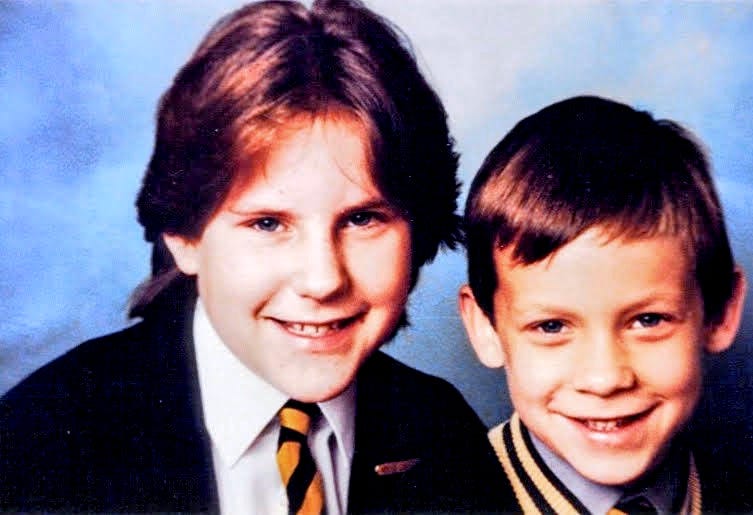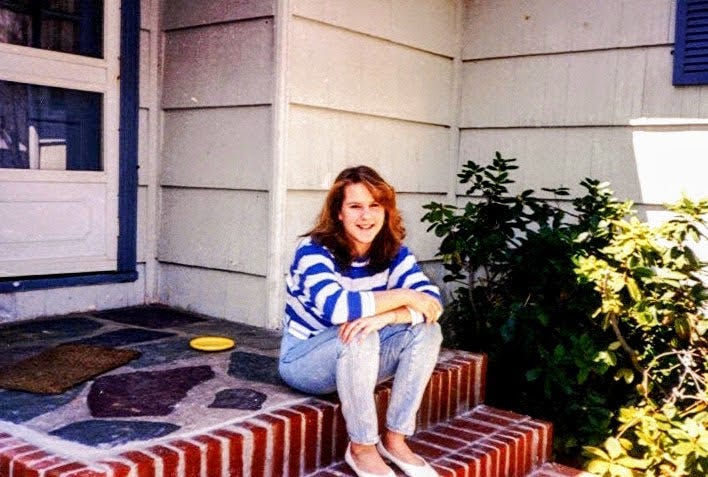Your 7th Best Friend - Girlhood in 5 states and the UK
I wanted friends; it's lonely playing barbies by yourself.
I moved around a lot as a kid. Born in Memphis, Tennessee, "the South" substitutes as my identity rather than a specific town or city. I've lived all over - five states and England - all by the time I was 13 years old. No, I'm not a military brat. I tell people I'm a cable television brat. My Dad was an electrical engineer, following the jobs where it took him through the 80's as the world wired.
Other kids who moved around are kindred souls. My best friend of 35+ years is one. We don't have an easy answer to the question "Where are you from?" We are eternal transplants, living in a continuous liminal space. The concept of home is different. We learned early on that home is your people, yourself.
I used to envy kids that grew up in one place, one house. They knew their neighborhood like the back of their He-mans. You knew how you fit, whether it was the neighborhood gang or the school clique. In every new city, I had to figure it out all over again.
My little introvert self had to improvise. As a new school year dawned, I spent energy to engage with other girls. I wanted friends; it's lonely playing barbies by yourself. I had to take what I got. Sometimes that meant the one girl waaaay to into horses or the foreign-born twins whose accent everyone made fun of. I didn't discriminate.
Girls are funny creatures. We're loyal, friendly, back-stabbing, and dramatic as we navigate the complex maze of childhood friendships. We feel deeply for others then can turn on a dime, rallying the clique to ostracize one girl from the group. A primitive and unconscious coping mechanism, getting everyone on your side against another intensifies feelings of connection. It's a girl thing.
I had my own set of stunts to get that feeling. In 2nd grade, we moved to Omaha, NE. Unpacking yet again, my parents piled stiff wrapping paper in a corner the living room. Sensing some indoor fun, my daredevil brother dove into the paper like a pile of leaves. But this was a new house with new contours and he hit his head, splitting it open on a bit of wall sticking out and had to get stitched up. This wasn't the first time he'd cracked his head open - that was when I threw a rock at him in Memphis. Who knew I'd have such aim at five years old? So this new injury didn't rock our worlds.
I'm not sure what got into me. Riding my bike around, I'd collected a few neighborhood friends of varying ages. My brother's stitches gave me a juicy bit of gossip. I had something semi-exciting to share but it needed a stronger hook. I told the teen boy down the road, an elderly grandpa, and a scattering of kids my age a story that my brother got the stitches because my Dad threw him into the wall. Brushing guilt aside, I reveled in the attention. I thought it was a great story.
Word got around to my parents and they sat me down, gravely describing the horrors of child abuse. As little kids, they threatened us with a spanking. The few times they actually spanked us resulted in a tepid indignity. I had no idea the gravity of my words on my Dad. Guilt hung on me like a backpack. I had to go on a correction tour, setting the record straight with every single person. Oh gawd.
The next day, I set out on my bike to defend my Dad's honor. Pedaling up to the teen boy, I engaged him in light conversation over handlebars. As the chatting dwindled, I took the moment to casually slip in, "Oh you know that story I told you about my Dad? I was just kidding." I popped a wheelie and skidded away. One down and countless to go but I was happy to find a slick way to undo my misdeeds that also saved face.
In 3rd grade, I found my niche among the girls - in New Jersey, at least. I became Jenny Focazio's body guard. A budding baby dyke, I was drawn to pretty girls. Jenny wasn't the most popular but she was sweet, friendly and had a nice smile. I was the heaviest of the girls and first to reach 100 lbs, so imagine my husky frame following her slight one, punishing any girl who didn't do what she wanted. My signature move was squeezing the backs of their necks to enforce the rules. I know, mild as far as me being the heavy, but it worked. It's not like Jenny was mean or anything. I was just focused on protecting her. No, really! Okay, fine. I might have taken the job a bit too seriously.
It's weird that I remember names from back then. I was teased for my weight. Colin Smith, another clique-less singleton in grade school, found his niche as the class clown. He'd follow me in the halls between classes bellowing, "Beached whale!" as he passed by me. I wasn't exactly sure why that was a slur but I sure felt it. As the perpetual new girl, I clung to any friend that would have me.
I was always 7th down on the list of best friends. In case you didn't know, girls back then made lists of friends in order of importance. Often the first three besties earned their place by establishing relationships at birth. There was no dislodging them. Since there's no 8th or 9th place so 7th is the bottom of the list. Once, when a girl moved away, I rose to 6th place. Oh, the glory. One time, I tried lobbying for fifth place - marketing my body guard services along with a prodigious barbie collection. I had the Dream House and the convertible, for god's sake. It never worked. Friendship was a transaction and I didn't have the right goods.
Moving to England in forth grade was dizzying. Suddenly, my "American" accent boosted me to the number one spot. Girls flocked, egging me on to say "Atari" in my strange and apparently delightful inflection. They asked if I had breakfast on the terrace like the family in the tv show Dallas. I didn't even know what a terrace was. Boys made unsolicited overtures for my attention. I had no script for this but I was figuring it out fast. I let myself be the first one caught when we all played "kiss chase" at recess. I basked in my new found status.
Samantha was the tallest girl in my group of friends at St. Margaret's C of E school. She was the first best friend of Julianne who lived across the street from me. Julianne and I had become fast friends, hanging out with Dyfed and Owen from next door and Hacket from down the road who did tricks on his BMX. We all bonded, playing tag and riding bikes until the street lights came on. Little did I know, a distant storm was gathering. School girl social pressures would push back on neighborhood friendships. Just as my star was rising, I found myself helplessly in the middle.
We all got crushes and Samantha must have heard I fancied her boyfriend. I can't remember his name but his best friend was Jonathan and Jonathan fancied me. Grade school tensions arose and Samantha decided to engineer a scheme. She would fake breaking up with her boyfriend and then he'd fake ask me out. Except I didn't know it was fake. Everyone was in on the prank but I was in the dark. I thought I'd finally won a prize and allowed myself to feel special. It wasn't long before Jonathan, unable bear the secret, cracked under the pressure and told me everything. I was humiliated. My supposed friends traded belonging for my secrets. It taught me to hide my desires. Conceal them away behind my stripped school tie and vest, so that no one, not even me, could expose them again.
These follies hardened my understanding of relationships. The story I carried about myself was this: to be included meant I had to be useful. No connection was free; I had to earn it. This is how I explained it to myself - I was too much - too much enthusiasm, emotion and neediness. I was less worthy or important, deficient and costly. Being close to me was exhausting, a burden. It was only a matter of time before friends would get fed up and leave. I told myself I had to be useful to keep people around. I could make myself indispensable by scrambling to anticipate and fill others' needs. Barbies, tickets and a ride to the movies, my accent, and body guard services later became suppressing my needs, enabling, overfunctioning, and people pleasing. The story evolved into telling myself I'd only be included if I was pleasant to be around. I learned to fly under the radar. From a kid's point of view, this made perfect sense.
I grew up thinking I was a bad kid. I craved attention like a sugar rush. Roles reversed, I was the older sister who had to convince my younger brother to play with me. Moving so much, he was my only consistent playmate. I describe my teen years as "tumultuous" because I dropped out of high school (twice) and ran away from home with my older boyfriend. There were a lot of....shenanigans. I caused my parents a lot of grief - all with the backdrop of my Dad's two heart attacks in his early 40's.
It wasn't until much later, in grad school therapy, that a new story presented itself. Pouring the woes of my misspent youth onto my therapist's lap, I practically made a case for how bad I'd been as a teen. My therapist offered this simple reframe: What if I wasn't a bad kid and instead, my parents didn't know how to help me? They had a lot going on, maybe they couldn't see I was struggling too. I was floored. Her reframe was valid. Maybe there was another way to add up the details of my life. The voice of doubt began to quiet and radiant embers kindled my mind. What if I wasn't a bad kid after all? What if I was just trying to cope with complex situations? Hmmm.
The tectonic plates of my identity had started to shift. I began applying the lens of adult perspective to all the sticky memories from childhood. Of course I was always the 7th best friend - the new girl, tacked onto the end of the list. They didn't know me. Compared to life-long friends, I was a stranger. Memories rearranged themselves like magic, slipping into a more comfortable order. I wasn't an afterthought; those girls were including me as a best friend. Jenny Focazio enjoyed my company and my services were icing on the cake. Maybe even something I conjured myself to feel more secure.
Samantha and Colin got a reframe too. Putting myself in her shoes, I imagined Sam felt threatened by my friendship with Julianne. She couldn't compete with the neighborhood bonds and resorted to girl fighting to keep me from taking her place. Colin was his own sort of exile at school. Targeting me wasn't personal. Making fun of other kids was the way he kept his head above the tempestuous social waters of grade school.
Maybe I wasn't a bad kid morphed into I was a kid like everyone else. This little reframe had a domino effect. Perspective allowed reframing, opening my eyes to new contexts and freeing me to edit my narrative for accuracy. Negative self attribution had filled gaps in understanding like rubbery gum along fractures in wood grain. Context dug it out, reframing my kid understanding with the refined lines of adult clarity. The debris of self blame fell away. Reframing was a grand new tool I used to rewrite myself. My long dormant self esteem began to emerge like green leaves from bulbs in snow.
From outside myself, I could see the process of identify formation. As kids, we are figuring out who we are and a lot rests on how others perceive us. Our reflection in another's mirror is naturally imperfect but a kid doesn't know that. We believe what we see. We try to make meaning of what happens to us. We want to know why. Without context, we naturally find fault in ourselves. It must be me. But everyone else is doing the same thing - struggling to figure themselves out, looking for their own reflections and coming to false conclusions. We bump up against someone else's story all the time. The storm of another kid's life dramas tattooed shadows on me. Adult perspective cut through the overgrown weeds of kid logic and I was free.
I still wrestle with the imprint of childhood experiences. The weeds grow and I hack them back with my steady adult self. The little girl part of me worries no one will come to my birthday party. Squeezing the back of her neck with suppression and people pleasing made it worse. Convinced she's unloveable, loving her anyway is slowly changing her mind. The wounded children inside me default to self blame and I'm reparenting them with reframing. During difficult times, I stick up for myself and resist the urge to compensate for my deficiencies with money or services. I don't sell myself out by bending too much for someone else. I'm not perfect and still need to evolve. But I'm more discerning of whose reflections impact me now. Only trusted others get a say and I listen, even when it's hard.
This is growth. I use the tool of reframing every single day. I ask myself if there's another way to view situations. I try to see my partner's point of view when we disagree. I don't automatically assume I'm at fault. I try to see all sides and take responsibility when it makes sense and hold others accountable for their parts. I know most of the time, whatever bad thing I'm dealing with can be chalked up to "shit happens." Sometimes, there's no one to blame. It's more gratifying to point fingers and I'm cautious of falling into the trap of least resistance. Tolerating the fact that sometimes bad things just happen is hard. You have a choice and not pointing that finger cracks you open and lights the ember of transformation.
You can't change the facts but you can update the story. New interpretations of your life history release shame, allowing the past to settle peacefully behind you. But it takes courage to resist the familiar lull old coping strategies. You have to stop running and instead, turn towards the bad memories, negative thoughts, and rotten ideas you have about yourself. Stop the critic's nagging pursuit, stand still and face up to reality. You've got to know what you're working with before you can change. Mapping your inner landscape helps you decide where to start.
I challenge you to an experiment. Invite the inner critic in for a chat. Pretend you're watching a tv show where it's being interviewed. Pretend it's a Muppet. Listen objectively as if it's talking about someone else. Can this critic back its claims with evidence? I bet not. The inner critic part fiercely defends because it's logic falls apart upon deeper investigation and query. Only you can debunk it.
Get into the habit of asking if there's another way to look at things. Use perspective to reframe. Investigate and query. Look for adult context and insist on facts. If there's at least one other way the facts add up then the inner critic's interpretation is suspect because there is another way to look at it. Ruthlessly edit for accuracy. Maybe you weren't a bad kid either - not the throwaway, 7th best friend scrambling to keep friends. Maybe you were just trying to cope with a complex life. What if you have just as much worth, value and importance as everyone else? I think we should be friends but let's agree to blow off the whole ranking system. It's too simplistic for us. Let's just get to know each other and see each other more accurately. I'll might still be your body guard but you'll have to pay extra. The loyalty is still free.
Thanks as always for reading. All jokes aside - if you enjoyed my writing, please subscribe and support me by becoming a paid member. I’m always building up resources. Paid subscribers get a say in what I research and write about. Check out the list of benefits here.








Wonderful. I have three daughters, and I see parts of old me playing out again. But, seeing it this time is comprehensive, and, so, I can love little kid me as much as I love them. It's a total reframing of who I thought I was.
Related on such a deep level, have to keep an eye out for my ", third wheel complex" in my friendships. Reframing is such a valuable and essential tool. I've learnt that I have often judged my younger self though the lens of my older self who always says .."what the hell were you thinking!!!!" Compassion to the rescue!